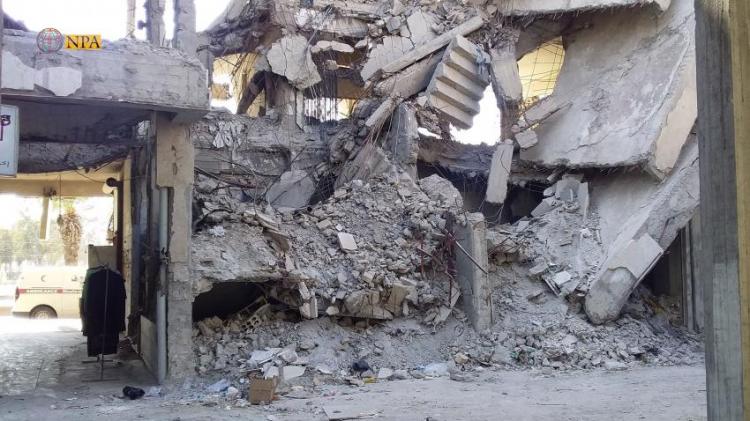No compensation yet for the affected by the Global Coalition airstrikes in Raqqa
Raqqa – North-Press Agency
Mustafa al-Khalil
The civilians of Raqqa northeast of Syria have paid a heavy price as a result of the fierce battles between the Syrian Democratic Forces (SDF) supported by the US-led Global Coalition and the Islamic State (ISIS) militants between June and October of 2017, where the Coalition’s airstrikes were more severe for many civilians.
Most of the houses were devastated, many of Raqqa’s residents lost their lives, while others were subjected to serious injuries which have changed the course of their lives forever, in addition to the almost complete destruction of the city’s infrastructure and the public facilities of the city.
![]()


Walid Hamoud al-Ghadban, a citizen of Raqqa and a paralyzed person as a result of being bombed by the Global Coalition fighter jets said: “The bombardment was intensified on the city of Raqqa in the month of Ramadan 2017, we couldn’t escape our houses, we were besieged from all parts”, noting that “ISIS militants were surrounding our neighborhood and prevented us from going out, while the war-planes were constantly bombing”.
As a result of the bombardment of the Global Coalition war-planes on the house of a neighbor, the wall which separates their houses, fell on him and he was paralyzed of quadriplegia, the loss of sense and movement.
“Now, I am completely helpless and unemployed, before being injured, I worked as a street vendor on a small carriage to help my family with the expenses, but now, I’m a parasite”, said al-Ghadban while the tears were pouring out of his eyes.
He was forced to sell his wheelchair which was provided to him by the Office of the Special Needs of the Committee of Labor and Social Affairs of Raqqa Council, in order to be able to buy his medicine box, which costs about SYP 7,000.
Al-Ghadban said that he didn’t receive any assistance from civil society organizations which operate in Raqqa, by saying: “The organizations haven’t provided any assistance for me, although I’m in urgent need for medication”.
“We have lost everything”
Zeinab al-Ali, who is a resident of al-Shu’ayb neighborhood in Raqqa, her house was destroyed as a result of the bombardment, she returned to it after ISIS expulsion from the city to try to restore it at its own expense, and with the help of some of the relatives.
“We returned to our house after the liberation of Raqqa from ISIS to find it completely destroyed. There were neither roof nor walls. We lost everything, even the furniture in the house was under the rubble, everything was destroyed”, she said.
“Our financial situation is difficult, my husband is a very old man and I have a single boy aged 26, he is a simple worker, and the wage he earns doesn’t meet our livelihood, and isn’t enough for the price of medication and treatment of my husband”, al-Ali added.
Compensation
The co-chair of the Committee of Labor and Social Affairs of Raqqa Council, Abdulsalam Hamsourek said that “till this date, there has been no compensation for the war-affected people in Raqqa”, noting that almost all Raqqa residents have been affected by the bombardment, but in varying degrees.
Hamsourek noted that they appealed to the international and humanitarian organizations, but “their response was timid”, noting that the amputation cases in Raqqa are mostly among the children, and all that “was given to the people was timid and didn’t rise to the scale of the tragedy they suffered”.
Hamsourek stated that some organizations have partially repaired the damaged houses, such as repairing the doors and windows in several neighborhoods in Raqqa, pointing out that the number of the houses which had been partially renovated are about 531 houses.
Regarding the role of the Committee of Labor and Social Affairs of Raqqa Council in compensating those affected, Hamsourek pointed out that about 9,000 people out of 19,500 who had registered their names in the Employment Office of the Committee of Labor and Social Affairs have been employed so far, within the institutions of Raqqa Civil Council and other organizations and associations in Raqqa, noting that “the organizations don’t accept the employment of the people with special needs because there are special standards for their employment”.
According to a report by Amnesty International and Air Works in April 2019, the Global Coalition fighter jets had killed “more than 1,600 civilians directly”, and destroyed more than 11,000 residential buildings in Raqqa, in addition to statistics which indicate the percentage of the total destruction in Raqqa to about 95

